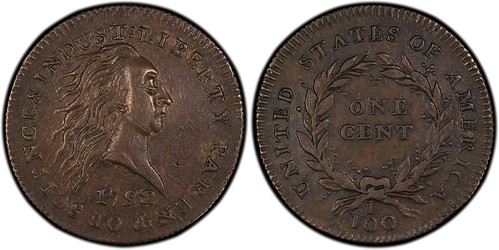
PREV ARTICLE
NEXT ARTICLE
FULL ISSUE
PREV FULL ISSUE
ANALYSIS CONFIRMS TWO COPPER 1792 PATTERN CENTS
Donn Pearlman forwarded this press release on behalf of PCGS CoinFacts and Professional Coin Grading Service. Thanks! -Editor

The Weinberg 1792 J-2 Cent Professional Coin Grading Service (www.PCGS.com) recently had the unique opportunity to perform metallurgical testing on two different examples of the extremely rare 1792 Pattern Cent. Both were shown to have been made of essentially pure copper instead of a “fusible alloy” containing copper and a small portion of silver. “The results give a clearer picture of how the U.S. Mint experimented on the earliest American coins in preparation for official coining in 1793. At least three of the nine known 1792 Cents originally designated as the Judd-2 variety now are confirmed to be composed of virtually pure copper,” said Ron Guth, President of PCGS CoinFacts (www.PCGSCoinFacts.com), the Internet’s most comprehensive source for information about United States coins. “This represents a major step forward in our understanding of early American numismatics, plus it was the first time these two rarities have been together in 224 years. Working with the owners of the two 1792 cents, PCGS arranged for an in-house, non-invasive metallurgical analysis of their coins,” explained Guth. One of the recently tested Judd-2 cents has been owned by collector Alan Weinberg of California since 1988 when he purchased it at a Bowers and Merena auction. Its pedigree includes the Lorin G. Parmelee, Virgil Brand and Norweb collections. Although uncertified, PCGS estimates its grade as EF45, making it the second finest known. The other recently tested coin, graded PCGS VF35, was unknown until 2004 when the Wolcott family from southwestern New York State brought their inherited coin to the American Numismatic Association World’s Fair of Money in Pittsburgh, Pennsylvania. It was certified by PCGS and its discovery generated nationwide headlines. Owners since then have included Anthony Terranova, Denis Loring, Legend Numismatics and Bob R. Simpson. The coin now is owned by a collector who wishes to remain anonymous after purchasing it through Heritage Auctions this past January. A third Judd-2 1792 cent, confirmed to be pure copper, is in the American Numismatic Association Edward C. Rochette Money Museum collection, and graded Good. Early United States Mint engraver Henry Voight, who also created the 1793 Chain and Wreath cent varieties, designed the Judd-2 variety. Judd refers to the book, United States Pattern, Experimental and Trial Pieces, a reference guide authored by Dr. J. Hewitt Judd. Coins listed in the book are classified by Judd numbers, including J-2, the current designation for 1792-dated cents made of pure copper. “1792 saw a flurry of activity aimed at establishing a mint in the United States. Congress passed a Mint Act, a Director was chosen, a parcel of land was purchased, a building was erected in Philadelphia and employees were hired,” explained Guth. “Several one-cent denomination coins were tested that year: a large copper piece known today as the Birch Cent (Judd-4); a smaller copper piece with a silver center (Judd-1); a piece of similar size in pure copper (Judd-2); and a piece of similar size with the copper and the silver center cent melted together into what is known as a ‘fusible alloy’ (Judd did not create a separate listing for such a coin).” “Mint records point to their experiment with fusible alloy cents, but none have been confirmed to date (one example tested years ago showed a small fraction of silver, but the margin of error of the test precluded a positive determination).” The search for a real Fusible Alloy cent continues. “Hopefully,” concluded Guth, “testing of the remaining 1792 cents will reveal the true nature of these remarkable coins.”
Non-invasive metallurgical testing is a boon for numismatic research, enabling the discovery of coin compositions without damaging the
piece in question to obtain a sample of the metal. Congratulations to PCGS and the coin owners for getting the facts. -Editor
Wayne Homren, Editor The Numismatic Bibliomania Society is a non-profit organization promoting numismatic literature. See our web site at coinbooks.org. To submit items for publication in The E-Sylum, write to the Editor at this address: whomren@gmail.com To subscribe go to: https://my.binhost.com/lists/listinfo/esylum All Rights Reserved. NBS Home Page Contact the NBS webmaster 
|